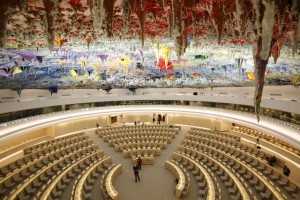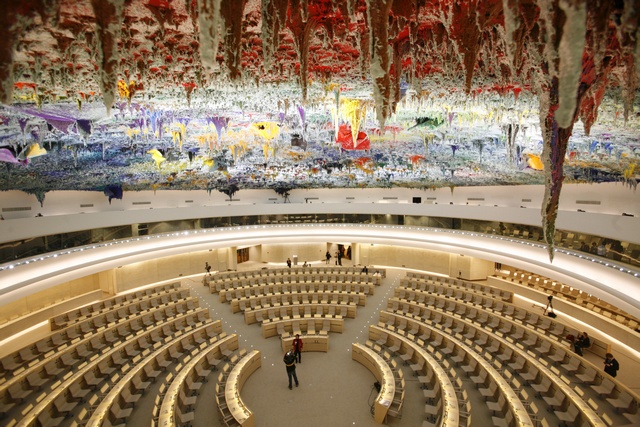
© 2008 Reuters
The UN Human Rights Council concluded its 19th Session, adopting several resolutions in relation to the ongoing struggle for democracy within the Arab region. Resolutions concerningLibya,Syria,Yemen, the Promotion and Protection of Human Rights in the Context of Peaceful Protests, as well as on Israeli settlements in theOccupiedPalestinianTerritory, were all adopted by the Council. While the Council continued to give attention to these issues, many governments rejected efforts to ensure accountability for rights violations committed before, during, and after democratic uprisings within the region.
“This session, governments such asEgyptandLibyalargely failed to pursue policies in line with the principles of freedom, dignity, and justice demanded by their citizens,” said Mr. Ziad Abdel Tawab, Deputy Director of the Cairo Institute for Human Rights Studies (CIHRS). “Instead, these governments adopted positions that not only contradict with those demands, but cynically use the uprisings that have occurred in their countries to justify continued impunity for human rights violations. Brave citizens who have been killed, injured, and tortured in the name of true reform and a break from the past, deserve better from their government representatives. We call on the newly elected Egyptian parliament and soon-to-be elected government inLibyato end this type of behavior by their UN representatives”.
Despite ongoing grave rights violations committed against democracy activists, protestors, and human rights defenders inBahrainandEgypt, the human rights situations in these countries have still not been addressed in any meaningful way by the Human Rights Council. Over the last year,Bahrainand the Gulf Cooperation Council member states, which includeSaudi Arabia,Qatar, andKuwait, all current member states of the Council, have consistently used their influence to ensure there is no consideration of the situation inBahrainby the United Nations.
Moreover, the Egyptian delegation have demonstrated strong hostility toward any attempt to address human rights violations in Egypt at the UN Rights Council, and has refused to acknowledge or engage on violations committed against protestors and democracy activists, including those committed under the Mubarak regime.
During a general debate at the Council session, several countries expressed deep concern over recent attacks against civil society and other rights violations inEgypt. According to Ms. Laila Matar, UN Advocacy Representative of CIHRS, “The response of the Egyptian delegation was to refute the existence of these violations and denounce those countries who expressed concern. In what has become an all too common occurrence at the UN, the Egyptian delegation actually cited the uprising in the country to justify their rejection of criticism and refusal to deal with human rights violations constructively. This is “revolution as propaganda” to justify a culture of impunity – an approach thatLibyahas also begun to adopt at the UN this session”.
In Council discussions dealing with a resolution on The Promotion and Protection of Human Rights in the Context of Peaceful Protests, co-sponsored by Costa Rica, Turkey and Switzerland, which is intended to help provide human rights protection for protestors in the Arab region and elsewhere, several Arab governments, including Egypt and Algeria, attempted to insert language that would give wide powers to governments to crack down on peaceful protests.
Egypthas also been at the forefront of efforts by the “Arab group” of states to ensure that the Council does not take any effective follow-up on past and present human rights violations inLibya. On 9 March, in a joint statement before the Council commenting on the last report to be presented by the UN Commission of Inquiry on Libya established last year, Lawyers for Justice in Libya (LFJL) and CIHRS, argued that “The Council must… explore ways in which to continue addressing ongoing, as well as past, violations [in Libya]. We call on the Council, through the Office of the High Commissioner for Human Rights, to continue to provide technical assistance toLibya, especially in relation to accountability mechanisms. We further call on the Council to ensure that the mandate of the Office of the High Commissioner for Human Rights continues to include a monitoring role”.
However, the resolution onLibyapresented by the Libyan delegation, ignored these calls by civil society and failed to ensure any meaningful follow-up on the issues of monitoring and accountability for human rights violations, including potential crimes against humanity committed in the country. Instead, the congratulatory resolution merely “encourages” cooperation betweenLibyaand the UN on human rights issues.
“The Libyan resolution presented byLibyawas effectively a whitewashing of very serious human rights violations inLibya. It is disturbing thatLibya’s first order of business after being reinstated as a member state of the UN Human Rights Council was to greatly weaken attempts by the Council to ensure accountability for past and present human rights violations in the country. The question is- what does this say about where the government is headed? Will one era of government impunity simply be replaced by another?” said Mr. Jeremie Smith, Director of the Geneva Office of CIHRS.
In a surprise development, last minute amendments proposed by Russia and Uganda on the Libyan resolution would have strengthened the text by creating a stronger reference on the need for Libya to address “arbitrarily detained… either release or bring those detained to trial,” highlight attacks against migrants, and would also have given the Office of the High Commissioner a mandate to inform the Council on ongoing human rights violations in the country. Arab states, theUnited States, and the EU all voted against these amendments, which were defeated by a small margin. The weaker resolution was subsequently adopted by consensus.
In a positive development, the Human Rights Council adopted a resolution on Israeli settlements in theOccupiedPalestinianTerritory, includingEast Jerusalemand the occupied Syrian Golan, establishing an independent international fact-finding mission to investigate the implications of the Israeli settlements on the civil, political, economic, social and cultural rights of the Palestinian people. The resolution enjoyed wide cross-regional support.
Also encouraging was the adoption by the Council of its strongest resolution yet onSyria, with wide support among Arab governments. The resolution calls for international accountability for potential crimes against humanity in the country, and includes reference to the UN High Commissioner for Human Rights’ request to the Security Council, made at the end of last year, to refer the situation to the International Criminal Court. The resolution also extends the mandate of the UN Commission of Inquiry onSyriafor another six months.
Despite the unequivocal confirmation by the Commission that crimes against humanity are being carried out inSyria,Russia,Cuba, andChinacontinued to oppose any attempts to ensure accountability for crimes committed inSyria, and were the only member states at the Council to vote against the Syrian resolution.Ecuador,India, and thePhilippinesabstained from the vote.
“While we welcome the support of Arab governments for accountability in relation toSyriaand their traditional support for the rights of Palestinians at the Council, unfortunately this type of approach remains an exception to the rule. In almost all other situations in the Arab region where serious rights violations are taking place, including in Bahrain, Egypt, Yemen, and now Libya, as well as other situations around the world, Arab states continue to act at the Council to uphold impunity for human rights violations committed by governments,” said Ms. Laila Matar.
Saudi Arabia,KuwaitandQatarall voted against a resolution onSri Lankaadopted by the Council which calls on the Sri Lankan government to ensure national accountability for potential crimes against humanity committed in the country in the context of its conflict with armed Tamil groups, during which as many as 40,000 civilians were killed. Notably,Jordanabstained, andLibyavoted in favor. Also,Saudi Arabia,KuwaitandJordanabstained from a resolution renewing the Special Rapporteur onIran, whileQatarandLibyavoted against the renewal.
A resolution on Yemen, presented by the Yemeni delegation, and adopted by consensus, “Welcomes and supports the invitation by the Government of Yemen to establish a country office of the High Commissioner” and “Requests the High Commissioner to provide technical assistance and to work with the Government of Yemen, as needed, to identify additional areas of assistance to enable Yemen to fulfill its human rights obligations.” The resolution also asks the Office of the High Commissioner for Human Rights to report to the Council on these efforts at its twenty-first session (September, 2012). According the Mr. Jeremie Smith, “It is disappointing that the resolution onYemenremains weak on the issues of accountability for recent and ongoing crimes and violations committed against democracy activists. However, given the acceptance ofYemento allow for a UN human rights office in the country, we see a potential increased openness by the government to discuss human rights challenges and to cooperate with the Human Rights Council. We hopeYemenand the Council will build on this development”.
Finally, an important thematic resolution entitled The Promotion and Protection of Human Rights in the Context of Peaceful Protests, adopted by consensus, tasks the Office of the High Commissioner for Human Rights, in cooperation with several independent UN human rights experts, including the Special Rapporteurs on Freedom of Assembly and Association, Freedom of Expression, and Human Rights Defenders, to create a report on the legal obligations of states in the context of protests, and the measures states should take when confronted by protests to promote and protect human rights. The report will be presented next March, at the twenty-second session of the Human Rights Council. CIHRS and others have insisted that the process should conclude with guidelines and principles that all states should follow when confronted with protests and which can be used to ensure stronger protection for demonstrators and protestors around the world, including within the Arab region.
Share this Post

